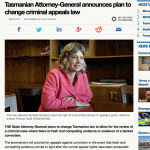
Tasmania announces it will adopt a new Right To Appeal law, providing a second chance to remedy miscarriages of justice. CLA’s national campaign has its first breakthrough!
Tassie to adopt Right to Appeal law
Tasmania is set to become the second state in Australia to adopt the Right To Appeal law.
Attorney-General Dr Vanessa Goodwin announced at Budget Estimates on 9 Sept 2014 that she would change Tasmanian law to allow for a criminal case review if new evidence comes to light after normal appeal rights are exhausted.
She said: “The only avenue currently available to a convicted person in Tasmania after normal appeal rights have been exhausted is to petition the Governor or the Attorney-General to exercise the royal prerogative of mercy. We believe it is appropriate that decisions on such appeals be given to the judiciary to determine, not the governor or attorney general of the day.”
The Tasmanian decision to bring in the Right To Appeal (R2A) legislation is the first breakthrough in a national campaign by Civil Liberties Australia to “mirror”the South Australian provisions throughout every state and territory of Australia.
President of CLA, Dr Kristine Klugman, and CEO Bill Rowlings briefed Dr Goodwin on the R2A legislation in August 2013 when she was Shadow Attorney-General. She immediately expressed “in principle”support for the equity of the proposed change.
At the same time, CLA briefed then-Tasmanian Labor leader Lara Giddings, now Shadow AG, and Greens leader Nick McKim. As both also expressed strong “in principle”support for the new law, a Bill is expected to receive fairly quick passage through the Tasmanian Parliament once introduced.
The CLA campaign follows seminal work by Dr Bob Moles and his Networked Knowledge group in Adelaide to convince the SA Parliament to pass the Right To Appeal law in mid-2013.
In Tasmania, AG Goodwin told Estimates in September 2014 that the prosecution had the right to seek a retrial on the basis of fresh and compelling evidence or evidence of a tainted outcome since 2008, and it was only appropriate that the defence had the same right.
“We believe it is fair that a convicted person be afforded the same opportunity,”she said, according to a report in the Hobart Mercury.
The Mercury said the current system of petitioning for the exercise of the royal prerogative of mercy had been criticised by legal commentators on a number of grounds, including the lack of formal process and transparency, and a perception that political rather than legal matters may be determinative.
“In one case, the petition sat on the desk of an Attorney-General of a mainland state for four years without any decision,”CLA CEO Bill Rowlings said. “In other places, wrongly convicted people have sat in jail for 19 years or more with no way to get their case re-heard by the courts, except by a political decision of the government, which is almost always refused.”
The Tasmanian Cabinet has decided that provisions introduced in South Australia last year are a suitable model on which to base an amendment to the Tasmanian Criminal Code. This step will give the defence the same powers as the prosecution when it comes to reviewing criminal cases.
Consultation with key stakeholders will begin by the end of the year, AG Goodwin announced. Civil Liberties Australia and Networked Knowledge will work to help Tasmania introduce a law even more fairly worded than the SA equivalent, Mr Rowlings said.
The Hobart Mercury commented that the move should be welcomed by supporters of Sue Neill-Fraser who is serving 23 years for killing her partner, Royal Hobart Hospital radiation physicist Bob Chappell, who disappeared from his yacht on the River Derwent on Australia Day 2009.
There is a vocal and growing group protesting her innocence and calling for a retrial, CLA says.
“Former Integrity Commission chief Barbara Etter is leading the push for the case to be reopened and has been joined by high-profile lawyers Robert Richter QC, Chester Porter QC, Greg Barns and Stuart Tipple as well as independent MP Andrew Wilkie and Civil Liberties Australia,”the Mercury said.
However, the Neill-Fraser petition for mercy may well be lodged in October, before the new R2A law is even off the drafting board, Mr Rowlings said.


CLA should be commended for its role in pushing for further right to appeal laws around Australia http://t.co/BwHiKhsq1I